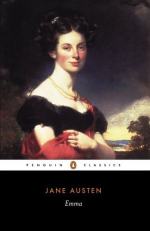|
|
Emma Chapter 9
Mr. Knightley stayed away from Hartfield longer than usual. And when he did return, Emma was still not forgiven. Her plans for Harriet and Mr. Elton were proceeding nicely; he had returned with the portrait, which was hung above the mantle and greatly admired (especially by Mr. Elton). Emma felt she had improved Harriet's taste, but her scholarly education went more slowly, because Emma had little patience for such work herself. The closest Harriet was coming to literature was her recent hobby of collecting riddles or charades into a little book. When Harriet asked Mr. Elton if he would write one for her book, there is a hint that Mr. Elton's affections might be elsewhere. Shyly, Mr. Elton doubts he could write an original charade, even with the inspiration of Miss Woodhouse; he quickly catches himself and mentions Miss Smith as well. Both Emma and Harriet are oblivious to this, and when Mr. Elton the next day gives his riddle to Emma, she still does not become suspicious. Emma solves it quickly, but the duller Harriet must be lead along to its' meaning. It is vague enough to be meant for either woman, but the line about "thy ready wit" gives a hint the object might be Emma. Having no such thoughts, Emma finds the riddle a compliment to Harriet, and congratulates her on catching the fine Mr. Elton. Shocked and happy, the innocent girl remarks, "'Whatever you say is always right, and therefore I suppose, and believe, and hope it must be so; but otherwise I could not have imagined it. It is so much beyond anything I deserve.'" Chapter 9, pg. 69
They must decide what to do with the riddle, and they decide to write and share it, except for the most personal last lines. They read it to Emma's father, who likes it very much; but they keep the author secret. Mr. Woodhouse's thoughts stray to "poor Isabella," who will be visiting with her family next week. He complains that this visit will be short, as have been all her visits since the sad day of her marriage. They are looking forward to seeing her two young boys, Henry and John. Mr. Woodhouse will be happy to have the boys temporarily under his care, because he thinks their father and uncle are too rough with them. Emma tells him that the boys like the roughhousing, as, "'That is the case with us all, papa. One half of the world cannot understand the pleasures of the other.'" Chapter 9, pg. 76
Mr. Elton returned later, and seemed confused by Emma's suggestions about the riddle. He remarked on the honor of it being written in the book, and Emma felt happy for Harriet, though she noticed that Mr. Elton's style of speaking could be annoying.




